 Loading...
Loading...-
The EU is much more than just its cities. Beyond the confines of larger urban centres lies a rich tapestry of towns, villages and open countryside. These are the places whose traditions and resilience have helped define Europe’s way of life for centuries. They are Europe’s heartlands. The EU’s rural and exurban areas account for over 80% of its total area and are home to over 30% of its population. Yet across Europe these communities feel disconnected. They feel detached from an increasingly remote political process—one which, they believe, gives precedence to the priorities of urban decision-makers rather than to the needs of smaller, less vocal communities. In many sectors, particularly in agriculture, people believe that their way of life is threatened by an unending deluge of European and national level regulations. Many feel abandoned by traditional political parties and disorientated by the rapid pace of economic and social change. Europe needs a new approach to rural development because not every town needs to become a technology hub, nor every village a tourist hotspot. Our Contract with Rural Europe provides a Five-Point Plan for Europe’s Heartlands. First, the Green Deal must become a positive partnership for farmers. Second, rural citizens are equal citizens requiring the same connectivity and skills as those living in urban areas. Third, essential rural communities require essential public services. Fourth, youth and quality of life will drive lasting growth. Fifth, the EU needs to get back to basics and start focusing on meeting the day-to-day needs of its rural citizens.
Agriculture EU Member States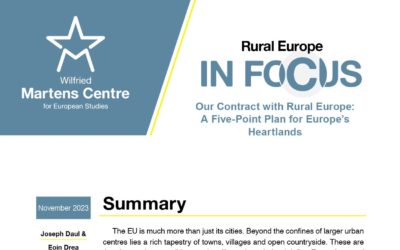
Rural Europe: Our Contract with Rural Europe – A Five-Point Plan for Europe’s Heartlands
IN FOCUS
08 Nov 2023
-
Unknown to many in the West, North-East Asian Nations – China, South Korea and Japan – have massively invested in the agricultural business globally for decades. And it is not only about food processing and shipping. We are talking about millions of square kilometres of fruitful soil now being in foreign investors’ hands. The strategic reason behind these outbound investments is quite apparent: famines and lack of cultivable land have haunted those nations throughout their history. The vast territory of China, for example, could give one the impression that productive agricultural land is the least the country is missing. The truth couldn’t be farther from it! The massive growth of population, large-scale conversion of land into industrial and urban development areas, massive degradation and loss of cultivable land due to environmental pollution, desertification and climate change – all these factors have made food security the highest priority of policymakers in Beijing. The same goes for Tokyo and Seoul. And the situation is further aggravated as 60-70 per cent of their food is imported, and North-East Asia depends on open sea lanes that are highly vulnerable to geopolitical conflicts.
The situation in Europe seems to be quite different. For decades, the Common Agriculture Policy (CAP) had to deal with overproduction on one side and, more recently, with the negative environmental impacts of traditional production on the other. Restoring and setting aside arable land are now at the centre of heated political discussions. But only the shock waves of the war in Ukraine brought food security back into the centre of the European Policy debate. Food security has shown its ugly face again as, both, a strategic asset and weapon. While global agricultural markets could compensate for short-term disturbances of war-induced loss of production and distribution at higher prices, there are structural challenges for the European agricultural sector, which will not go away when “peace” is re-established in Ukraine.
The European Commission’s reaction to the “evolving crisis” was “to make EU food production more resilient and environmentally neutral while remaining competitive and able to provide EU consumers with affordable and nutritious food.” We have heard almost the same song for many years in the energy sector, yet we are farther away than ever from achieving a higher degree of security. Why?
For an answer and potential remedies, one has to go into the dominating policy concepts of European (agricultural) policies, including a good piece of ideology, which is even harder to overcome.
First, the EU didn’t consider the agricultural sector, in all its complexity, as strategic infrastructure. While the vulnerability and protection of, e.g. ports, electricity lines and IT infrastructure finally got the attention of politicians and enterprises it deserves, this is not the case with agriculture. Remarkably, Europe still sticks to the illusion of the “invisible hand” of global markets as followed for too long in energy and raw materials. Acknowledging those shortcomings does not mean that we should now try to become self-dependent. Being linked into international marketsis not a contradiction but remains an important building block of de-risking.
But secondly, rethinking the guiding principles of domestic European agriculture policy is equally important and overdue. Investment in agriculture is among the most lucrative global business models. Next to the Asian countries, the autocratic regimes in the Middle East are also heavily engaged in this business, including in Europe. A more effective screening of inbound investment of critical infrastructure such as high-tech companies doesn’t include the agricultural sector so far. Chinese investors buying famous French domaines and châteaux caused some outcry, but rather for reasons of national identity than of strategic vulnerability. The EU forcing thousands of small and middle-size farmers to give up their farms to reduce nitrogen emissions will only speed up the concentration and industrialisation processes in the agribusiness. Day by day, the praised model of small, sustainable and family-owned farms is diverging more from reality. This destroys an essential part of European “societal infrastructure”.
Thirdly, further regulations, (e.g. in the research and application of genetically modified plants) limit European farmers’ options to adjust even to climate change while international competitors in the US or Asia don’t operate under similar restrictions. The amount of alternative “bio” production on European soil is not enough to satisfy European consumers’ demands at affordable prices. As a result, the need for imports will increase, even if we assume changes towards more climate-sensitive consumption patterns. As the discussions of carbon border adjustment mechanisms (CBAM) or responsible supply chain laws show, the EU is about to create new walls of green protectionism and it pushes production out of Europe. And one should not believe, that Europe is any longer powerful enough to unilaterally impose its environment or labour standards, given the competition with other quickly growing markets in developing countries.
Some “experts” now see a huge opportunity for European food security in the accession of Ukraine, the largest agricultural producer in Europe. But political stability nor the legal framework of the future integration are clear. Moreover, how and to what extent Ukrainian agriculture will contribute to Europe’s food security is far from given, as other non-European investors are already knocking at Kiew’s gate.
Europe must rebalance its often ideologically driven approach and put security and affordability of food at the centre of its agricultural policy. This includes improving business perspectives for the next generation of rural farmers and an innovation-driven path to sustainable and safe food production.
Food security must become again an essential element of Europe’s critical infrastructure and a building block of Europe’s resilience.
Peter Hefele Agriculture Security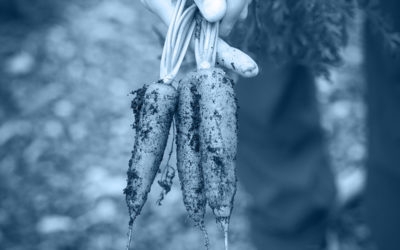
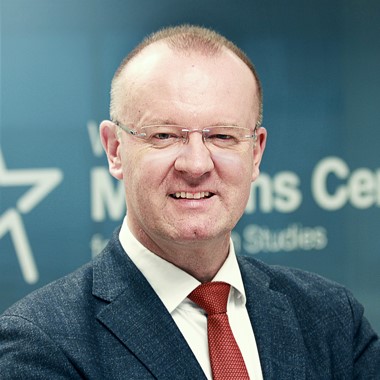
Peter Hefele
Food security: an underestimated critical infrastructure in Europe
Blog
22 Jun 2023
-
I say Europe, you say…?
When I think of the European Union, I always think of an old Irish word: “meitheal.” It’s an old tradition where people from the neighbouring farms came together to help each other, to save the crops, to save the hay. The essence of it was to be reciprocal, and it benefited everybody. This is the way I feel about Europe. When we come together, we devise a way in which we can work together. We share our sovereignty to some extent, but we help each other. And I think that Ireland, my own country, can certainly be a testament to this kind of solidarity.
What is the most interesting myth about the EU you needed to bust in your career?
Yeah, the first thing I suppose in my own portfolio, I had to debunk the myth that farmers were not needed in order to ensure that we achieved a number of our objectives in relation to public goods. You cannot actually have a good environment, a good landscape, you cannot have good conditions of food standards and food security without the participation of our farmers.
So, I had to convince people that if we want to have action on all these public goods, including growing ambitions on environment and climate action, we need people in the rural areas who will do this work for us. And I don’t know of any other sector that can do this work except farmers, and we have to reward them. So, the common agricultural policy is a good vehicle in order to ensure that we achieve a lot in our public goods agenda.
You grew up on a family farm, so we wanted to ask you what your favourite chore was.
Well, first of all as a young person I was really thrilled when I could drive the tractor. And then of course, when I was a little bit older, I liked managing the dairy herd, particularly in the summertime, it’s not so easy in the wintertime. But it was wonderful to see the cows eating the fresh grass and seeing the flow of high quality milk during the summer months.
You have said that the Common Agricultural Policy is “constantly evolving to meet the challenges of the day.” What are the major challenges for agriculture going to be over the next decade or so?
I suppose generational renewal is always going to be an issue. We need to get more young people involved, it’s a big disappointment that only 6% of the farmers of Europe are under 40 years old. And equally then we have to get our farmers to do more on the climate and environment agenda. They are the big challenges; protection of our natural resources, climate action, and getting more young people into the area of agriculture and the food business.
You have developed a reputation as a tough negotiator over your political career. What do you do to avoid “having beef” with your counterparts?
I respect everyone’s point of view. And, you know, I think if we are good negotiators, we have to understand that there has to be an outcome that each side can sell to their respective stakeholders and constituents. And this is the basic principle which I apply to all politics: negotiation is a people business, and therefore if you respect people and understand their personal objectives in any negotiation you will hopefully be able to find an accommodation that is good for both sides.
This May, you said “we urgently need to tackle climate change and the degradation of our ecosystems if we want to preserve the planet for future generations.” What is the EU doing to make the agri-food sector more environmentally sustainable?
Well, as we see in the Common Agricultural Policy proposals that we published in June 2018, we have doubled the amount of funding in relation to actions on climate, and we have to make sure that these targets are met by every member state, and by each sector, in line with the Paris international agreements. Also, we are linking every cent of the Common Agricultural Policy to climate and environment action in areas of conditionality, and in areas of direct investments. So, we have to make sure that our farmers play their part.
Your home county, Kilkenny is famous for its success in hurling, Ireland’s national sport. Which Commissioner do you think would make the most formidable hurler?
Oh, I would certainly say the President of the Commission, Jean-Claude Juncker, he has mastered the concept of the political side-step – which is very important in hurling. He’s always one step ahead of the game as well.
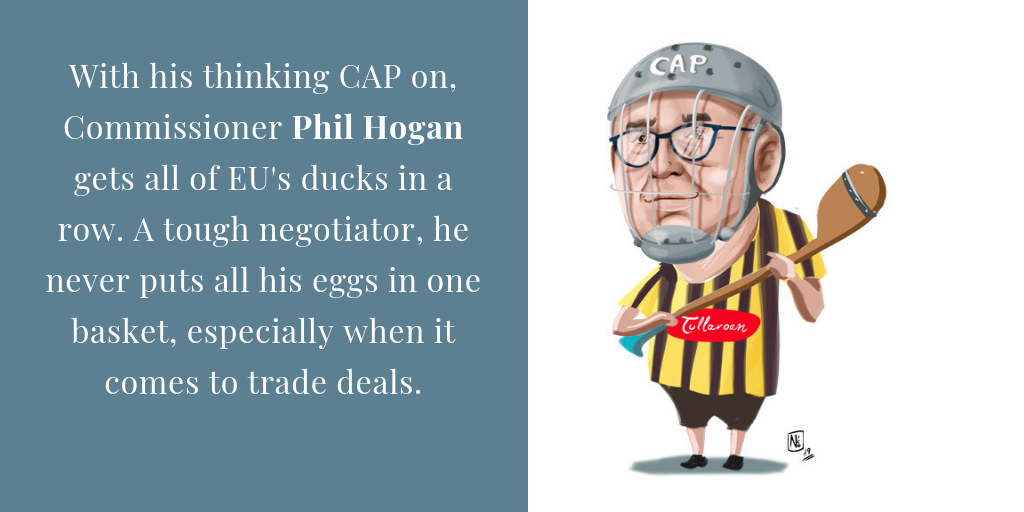
According to Eurostat, by 2050, the population of Europe’s urban regions is projected to increase by 24.1 million people. By contrast, the population of rural regions is projected to fall by 7.9 million. How is the Commission going to tackle rural depopulation and revitalise our rural areas?
Well I am very conscious of this major challenge for the vitality and vibrancy of our rural communities. And this is why I convened all stakeholders in 2016 to a conference in Ireland, and we adopted the Cork 2.0 declaration for rural areas. And we are now implementing these proposals in the Common Agricultural Policy reform; which require investments by every member’s state in rural areas.
Also in broadband connectivity, and in the concept of smart villages – which is putting the focus on village settlements to ensure that they have all the connectivity and social, economic and environmental capital that they need for people to live there. And if we focus on these issues in the context of our pillared funding in our Common Agricultural Policies and our Rural Development Policies, I think this would make a big difference in the next 7 years.
What are the three things you must have in your suitcase when you travel?
Well apart from the usual necessities I need an iPad, I need a good book to read for the long-haul flights, and of course I need to have the latest proposals and policy papers from the Martens Centre!
Ireland is going to be the EU member state most impacted by Brexit. How is the Commission preparing to shield Ireland’s vital agri-food sector from the effects of the UK’s withdrawal?
Well first of all the European Commission on the whole has really acknowledged the unique difficulties that would emerge in Ireland in the event of a hard Brexit, and this is appreciated by the Irish people. We now have 95% of the people of Ireland in recent surveys saying that they are very pro-European. So, I am very pleased about this. And Mr. Barnier and Mr. Juncker have made it clear on many occasions that it’s Ireland first.
But of course, we are developing the necessary responses in all of the Commission to help all member states, including Ireland, in the event of a hard Brexit. And we will see in the event of a hard or soft Brexit that we’re able to cope with some of the difficulties in Ireland. We want to maintain the peace process, and we want to maintain the strong trading relationships between Ireland and the rest of Europe in the event that we are cut off from some of the opportunities in mainland Europe by the bridge that we have through the UK at the moment.
So, many challenges, but European solidarity is very much appreciated in Ireland.
The EU recently signed off on a free trade agreement with Japan. What will the benefits for Europe be?
Well most of the tariffs have been eliminated, and particularly on industrial goods, and we have the biggest trade deal ever achieved by the European Union. Japan represents 120 million people, but it represents about a quarter of the world’s GDP, and therefore it is certainly a contributing factor to the enormous amount of purchasing power for European and Japanese consumers alike, when we join together as 630 million people. So, this in agriculture and industry is a wonderful opportunity, and we already see the benefits of it.
Guinness or Kilkenny Beer?
Kilkenny; it’s brewed in Kilkenny, my native city.
Which comes next: US or China trade deal?
US is to be expected, if they start to behave themselves a bit better.
The ‘1-hectare Initiative’ or ‘Trees for Kids’?
‘Trees for Kids’ because it’s nice to see the young generation embracing the climate and environment impact of more deforestation as quickly as possible.
Agriculture Brexit Centre-Right EU Institutions Leadership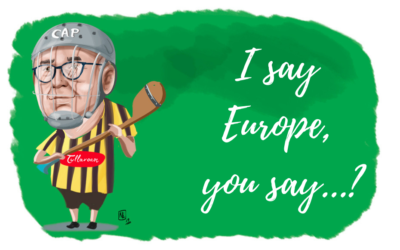
I say Europe, you say…? Interview with Phil Hogan
I Say Europe
27 Jun 2019
-
I say Europe you say…?
Home. That’s what I say when you say Europe. I am Irish, I live in Ireland, it is my home. I work in Brussels, but I very much see Europe, the European Union, as also home. I hope that people look at it that way.
You have been nominated by Marianne Thyssen and her question was: “What is your message to European citizens ahead of the upcoming European elections?”
First of all, thanks to Marianne for nominating me. I think my message is a consistent one: to try and understand what Europe is rather than looking at what its failures are. I think we look only where the European Union is weak, but tend to forget where it is strong.
I would say to people to look at the values the European Union has brought to their lives and the value of peace, the difficulty of working together, but also the importance of countries working together. The value of being around a table is much greater than when countries operating completely separately or drifting off, as it is happening with the United Kingdom. I think we are greater when we are together.
You’ve been a presenter of the show “Ear to the ground” in Ireland. We wanted to ask you how do you manage to keep the ear to the ground and listen to the needs of your constituency?
Wherever I am or whatever I am doing either working in plenary or in this office, I’m always thinking of the people I represent. When I am in Ireland, I am with the people I represent. So I never lose touch. I even use the phrase ‘keep my ear to the ground’ all the time, because it makes people connect with my past and with the television programme I worked on but it also says a great deal about the work I do and how I do it. I mean what would be the point of being in this job if we didn’t work tirelessly for and on behalf of the people who have elected us!
Do you think that we are looking at a no deal Brexit and if so do you think that the EU is ready for possible scenarios?
I think for all of us a no-deal Brexit is almost unthinkable. The EU and individual Member States and especially the United Kingdom, are putting plans in place for that possibility, but I don’t think there is anybody wishing for a no-deal Brexit, because every single aspect of all our lives will be negatively impacted. Sometimes I get the impression that some in the United Kingdom think that they will be
immune to the negative impacts of no-deal, but in fact they will be hurt by a no-deal. I am really hoping that good politics will prevail over mediocre or bad politics and that we can see the value of the withdrawal agreement that is on the table and that it will be ratified, I hope, by the House of Commons in January.
What is the most interesting myth about the EU you needed to bust in your career?
Funnily enough, I think a lot of myths have been busted because of Brexit, which to some extent happened because there were so many myths out there that got oxygen in the UK press and that were never discredited. I think the expression I find most distasteful is ‘faceless Brussels bureaucrat’ – I have been called that when I have been on British media. It is a generic term of disrespect for anyone involved in the EU, elected or not.
I am not faceless and I am not a bureaucrat. But I have great respect for bureaucrats. The people who work in this office with me could be termed faceless bureaucrats and in their work every day they have people front and centre in their minds, assisting them on an individual basis where required and collectively through work on legislation.
How do you think that digitalisation and robotisation are impacting health systems of European countries? What is the EU doing to use the technological advancement to ensure healthy and active life for its citizens?
I recently visited a company in my own constituency, a new company that was developing a robotic production line for sale to the US. I was mesmerized by the technology. These robotic production lines are going to replace some of the difficult jobs that individuals were doing. So I think at that level you are going to see a displacement of people by robotics and hopefully those people can be trained to do other work, which may be more stimulating and more beneficial.
When it comes to the health systems, I recently had someone I know undergo surgery with robotics. So I think for our health systems and for the quality of the health care, robotics will be more common in diagnosis, treatment, and surgeries. The biggest challenge for the European Union and Member States is to ensure that our legislation and our rules keep up to speed with the pace of change in new technologies – this is part of our Medical Devices Regulation, which is currently being implemented. I think these issues will have huge impacts and what we all want to know is that they will be positive.
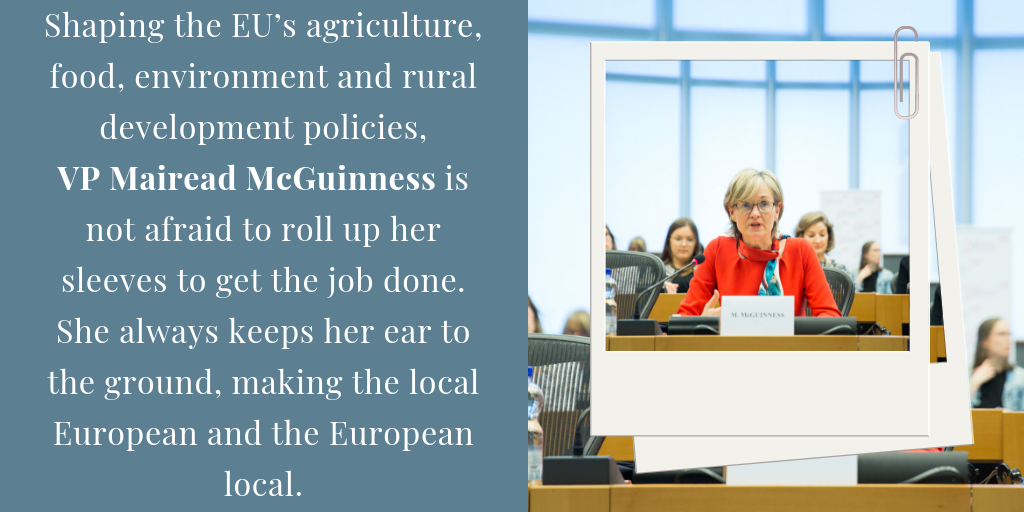
As the VP of the European Parliament, could you share with us your favourite anecdote from a plenary or committee session? Which MEP has the best sense of humour in your view?
What I love about chairing the session, especially when there are votes and there are issues, is the challenge of maintaining control. I think it is quite a mind game and I enjoy that. Funnily enough, I did use a gavel in the chamber recently, which was produced by a voluntary group called Men’s Sheds Ireland, who had won a European Citizen’s Prize. I bought the gavel from them and opened the voting session with it. I got a great warm round of applause.
I think the Irish have a great sense of humour. And we have the ability to make people laugh, to laugh with others and laugh at ourselves. I hope we have scattered a little bit of our sense of humour across the Members States. Frankly, I think the more laughter we have, the more humour we have in our work in the plenary, I think the easier it is to get work done, because sometimes being too serious and too methodical and too rigid all the time doesn’t get the best for people. We all need to laugh more.
Could you pick your three favourite Twitter Accounts?
The Grand Auld Stretch (@theauldsthretch) is certainly one of my favourites. My next one would be an account dedicated to Seamus Heaney (@HeaneyDaily), one of our very famous poets. Every day somebody somewhere puts out a few lines written by him. On one occasion when I was chairing the plenary and it was a bit tense, I took an eye to what was up that day and I decided to read it at the end of the debate, and it fitted quite perfectly with the debate that was going on.
The third one, well there’s a very interesting dairy farming family in Cork in Ireland. Their user name is @Peterhynes15, but it’s not just about Peter, but his wife Paula and their 3 daughters. They tweet all the time from their milking parlour, from their car, from their kitchen and it’s absolutely fantastic.
Who of your colleagues would you team up with to sing Christmas carols?
We were doing a picture with the EPP and Deirdre Clune, Eva Paunova and myself decided to sing along as well. So, the three of us have already sang, so we could do that again! I do like singing, I don’t have a great voice, but again I think in Ireland we sing regardless of the quality of our voices! Though there are some fantastic Irish singers.
With a post Brexit pressure on the CAP budget, what can be done to create funding for new policy initiatives in agriculture?
I think the problem Europe faces is that the more we do together, the more we want to do together. I think we’re going to have to have a very honest conversation amongst ourselves. If we’re going to have less money for those policies, what we need to do, and we’re doing it, is look at what the market failures are when it comes to food. We just signed off on legislation banning unfair trading practices in the food supply chain. I hope this legislation will help reduce the relentless pressure on producers and hopefully give them a better share of the final retail price.
What it comes to getting more money for the EU budget, it is down to the member states. They will have to look into their hearts and ask themselves if they will match their words of support for agriculture and rural regions with hard cash. The more we have moved away from linking support payments to production, the more difficult it has become to find a system that is sustainable, that meets the needs of farmers and is fair.
What made the top of your New Year’s Resolutions list for 2019?
I am going to be kinder to myself, to ourselves in the office. We work hard and we work long hours. We are very committed to do the best we can. I think that sometimes in all of that delivering and trying to answer everybody’s needs, we forget that we’re all human beings and that we need a little time off. And I suppose because of the elections, I’m going to have to make sure I don’t run at too fast a pace. I’m saying this knowing I’m going to fail in my own aspirations. But it is no harm to set out this, at least as an objective.
Choose one of the following: radio or print journalism?
Radio for the drama and communication. Print for endurance.
Leprechauns or smurfs?
I mean there is no choice here! Smurfs aren’t real, but leprechauns are.
Guinness or Stella Artois?
Water.
Which EPP colleague would you suggest for the next interview? What would be your question for her or him?
I think you should interview Esteban González Pons. Maybe you could ask him about the Smurfs versus the leprechauns. Not as the first question, but just don’t forget to ask him that. I won’t explain why.
Agriculture Brexit European People's Party Leadership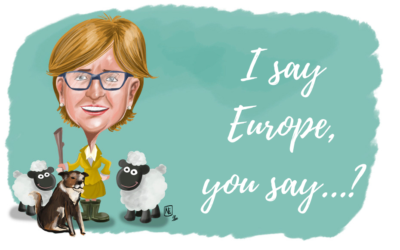
I say Europe, you say…? Interview with Mairead McGuinness
I Say Europe
20 Dec 2018
-
Technology is transforming the world around us at a growing pace. It affects the way we live, the way we study, the way we trade, the way we communicate. And it can be disruptive. It puts into question long cherished assumptions, it makes communities more fragmented and fluid and – crucially – it can destroy jobs in the industries it challenges. Are we to conclude that the world would have been better off if we had artificially restricted the development and commercialization of trains, cars and electric devises? Obviously not. This lesson is still valid for tomorrow’s technological developments.
It’s around these pressing issues that experts from all over Europe gathered for the 7th Economic Ideas Forum. Organized by the Wilfried Martens Centre for European Studies, the official think tank of the EPP, the EIF’s aim is to act as a laboratory for policy-oriented ideas. This year’s edition has six main takeaways to pick our brains:
1. Keep Calm and No Basic Income
Today, the majority of jobs in Europe are still full time, permanent positions. But labor markets are changing as technological advances and flexible working options increasingly dominate the discussion. Basic income, many people say, offers a potential solution to the emerging realities of tomorrow’s labor market. But according to one speaker, a universal basic income will simply let big business off the hook in terms of providing corporate and social responsibility. In Europe, we should distinguish between being more educated and being more skilled.
2. Creative Bravery: Celebrating Failure, Changing Europe
One participant quoted Nobel Prize winner economist Wassily Leontief: ‘The role of humans as the most important factor of production is bound to diminish in the same way that the role of horses in agricultural production was first diminished and then eliminated by the introduction of tractors’. We need to move towards a system in which individuals and firms can innovate ‘without permission’ as regulations often distort or prevent the creative process. In Europe, the risk reward balance needs to be reset. Failure is an option, because out of failure comes innovations which change the world.
3. To Be Digitalized or Marginalized: That is the Question!
The European Fund for Strategic Investments (EFSI) offers huge potential for the EU to close the digital infrastructure gap with other global economies. For this to happen, public money needs the support of private capital in order to tackle market failures. The right regulatory framework requires a light and flexible approach, allowing private enterprise to bring their strengths to the next-generation digital economy. In Europe, fierce competition is the best way to ensure lower prices and higher investments.
4. Conscious Uncoupling: Living Happily Even after Brexit
The success of EU integration has been constituted by the internal market and the free movement of goods, capitals, services, people. These principles constitute the basis of the market economy model. To build walls and limit freedom of movement now would be not just counterproductive but also impossible. Free movement of people and jurisdiction of the European Court of Justice are two key negotiation points. If the United Kingdom accepts these principles, an agreement may be possible. However, according to Alexander Stubb, former Prime Minister of Finland and speaker at the head-to-head session on Brexit, this seems to be an unlikely scenario.
5. ‘Nothing is lost, nothing is created, everything is transformed’
Fragmentation must be overcome. Only through combining the strengths of member states can the EU hope to add value at an industrial scale. European industry is going through a fourth industrial revolution: digital transformation is changing how companies do business on a daily basis. European industries still need to challenge fragmented markets, fragmented standards and fragmented national regulations. In Europe, we need to think globally.
6. Can Cows Save Europe?
Agricultural policy has been at the heart of EU policy since the Treaty of Rome. Research just doesn’t happen in factories and labs; it happens every day in millions of farms throughout the EU. In a time of huge global population change, land scarcity and increased environmental awareness, research and innovation in agriculture matters more than ever. For the EU, this means not just ensuring European farmers have the best knowledge transfer gained from private sector companies, but also helping farmers in emerging countries learn from our expertise. In Europe, agriculture must remain one of the most innovative and research intensive sectors in our economy.
Agriculture Business Economy EU Member States Innovation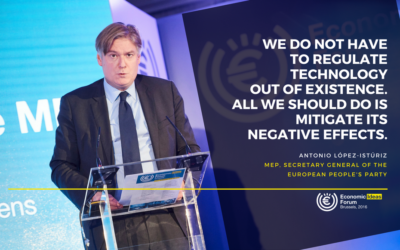
Tomorrow’s Europe in Six Steps
Other News
09 Dec 2016


